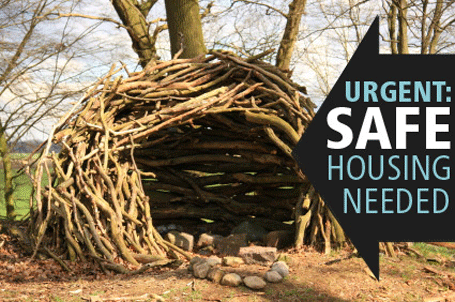New Housing Non-Profit Forming with Focus on Environmental Sensitivities
Snowflake, Arizona USA – June 7, 2010 – Re|shelter is a new non-profit organization forming to address the urgent need for housing alternatives for people with environmental intolerances, who experience mild to life-threatening physical reactions to extremely low levels of chemicals, mold, electrical fields, and other environmental factors and have great difficulty living in their conventionally built homes.
Currently applying for 501(c)3 status, the charitable organization is committed to addressing the global housing crisis and high rates of homelessness and suicide within vulnerable populations affected by disabling environmental sensitivities. Their activities will include fundraising, awarding housing aid grants, facilitating the design and construction of healthy homes and communities, and using the arts to promote awareness.
Co-founders Julie Genser and Julie Laffin formed the charity because “the need is so great, and no one else is doing it,” says Genser. Genser and Laffin are hoping to direct funding from government and the private sector to help prevent homelessness and further suffering for those unable to secure safe housing due to their own limited resources. Both Genser and Laffin were disabled by severe chemical, electrical and other environmental sensitivities within the last six years and have a firsthand understanding of the housing struggle for this population. The two met online four years ago in a group for artists with chemical sensitivities.
Genser and Laffin will comprise the Board of Directors. The Advisory Board has 16 notable members with experience working in related fields, or with the illness itself, including William J. Rea, M.D., a pioneer in environmental medicine and safer housing construction, Pamela Reed-Gibson, Ph.D., an author and researcher of the life impacts of environmental sensitivities, Magda Havas, Ph.D., an expert on the biological effects of electromagnetic radiation, Carl Grimes, President of the Indoor Air Quality Association, Bennie Howard, the former director of the Office of Disability at HUD, Susan Molloy, a long-time disability rights activist, and Paula Baker-Laporte, an architect experienced in building for those with environmental sensitivities.
Some of the group’s planned projects include awarding home renovation grants to eligible individuals, construction of a clean air community as well as an emergency shelter, and an architecture school outreach program that educates students while collaborating on re|shelter’s projects.
Genser studied Design and Environmental Analysis/Interior Design at Cornell University and coordinated construction projects prior to getting ill. She had just become certified in permaculture and ecovillage design, and was enrolled in an intensive 4-month sustainable architecture semester at ECOSA Institute when she became severely disabled by environmental illness and had to drop out of the program. She has unique insight into re|shelter’s target population: the last five years she has moved seven times in search of safe housing that did not severely affect her health.
Laffin also knows the struggle of finding safe housing; she searches each summer for a place to escape the aerial crop spraying in her home county in northern Illinois. Driven by compassion and personal insight into the particular problem of housing for those with environmental illness, the two are very excited to be taking this important step, as there is no other organization in existence today that is solely focused on housing solutions for those with environmental intolerances.
Contacts: support@reshelter.org
Website: Re|shelter
Related Articles:
- Zurich targets first MCS-Housing Project in Europe and issues an invitation to tender
- The last few months of life of Angelika who was chemically sensitive
- An Italian Multiple Chemical Sensitivity Sufferer shouts an inconvenient truth with his death

